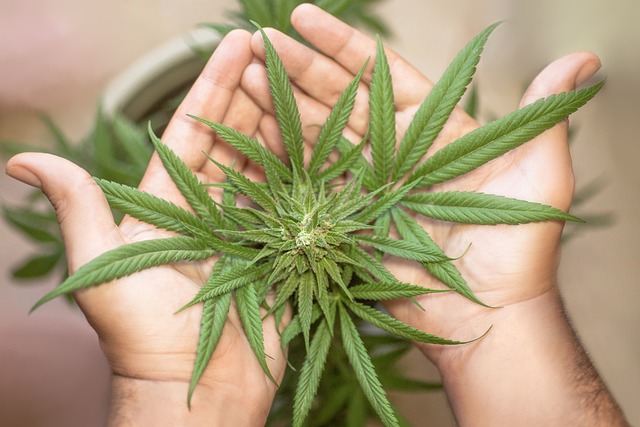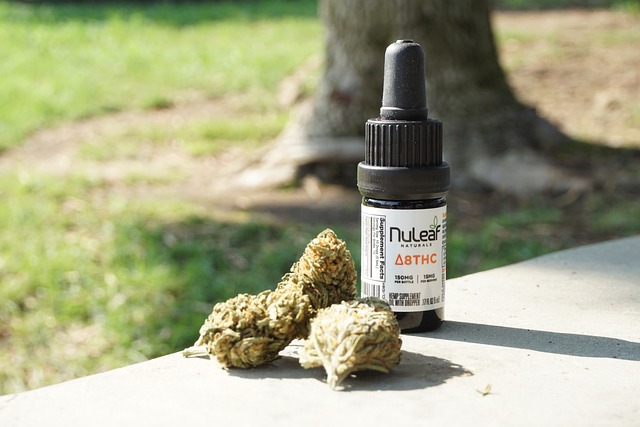New Mexico has become a trailblazer in cannabis legislation by legally recognizing THCA, a non-psychoactive compound of the cannabis plant with potential health benefits, as distinct from its psychoactive counterpart THC. This legal distinction has opened up new consumer options, allowing for the purchase and use of THCA flower without the mind-altering effects typically associated with cannabis. The state's nuanced approach to THCA legality serves as a model for other states considering similar legislation, providing clarity that has made it easier for consumers to access THCA products. The unique legal status of THCA in New Mexico facilitates scientific research into its therapeutic properties, with ongoing studies potentially uncovering novel applications due to its anti-inflammatory and neuroprotective qualities. Cultivation of THCA flower within the state is regulated under a comprehensive framework, aligning with both federal and state laws. Consumers interested in the benefits of THCA can legally purchase it from licensed retailers aged 21 and over, with a variety of consumption methods available. This growing market underscores the importance of consumer responsibility and purchasing from reputable sources to ensure compliance and safety.
Discover the multifaceted world of THCA flower, a non-psychoactive cannabinoid that’s gaining attention for its potential health benefits and legal status in New Mexico. This article delves into the emergence of THCA as a legitimate cannabinoid, exploring its scientific foundations, cultivation nuances, and market availability within the state’s regulatory framework. Join us as we navigate the evolving landscape of THCA legality and how it’s reshaping New Mexico’s cannabis industry.
- Understanding THCA Flower: The Emergence of Cannabidiol Legality in New Mexico
- The Science Behind THCA: Potential Benefits and Medicinal Properties
- Cultivating THCA Flower in New Mexico: Legal Framework and Best Practices
- Exploring the Market: Where to Buy THCA Flower Legally in New Mexico and Consumption Options
Understanding THCA Flower: The Emergence of Cannabidiol Legality in New Mexico

Navigating the evolving landscape of cannabis legality, New Mexico has paved a significant path with its approach to THCA flower. Tetrahydrocannabinolic acid (THCA) is the non-psychoactive precursor to THC, found abundantly in raw cannabis plants and gaining attention for its potential wellness benefits. In New Mexico, legislative efforts have been instrumental in shaping a legal framework that allows consumers to engage with THCA flower. The state’s legislature has recognized the distinctions between THCA and its psychoactive counterpart, THC, leading to regulatory policies that differentiate between the two compounds. This discernment has opened up new avenues for those interested in exploring the potential health benefits of THCA without the psychoactive effects typically associated with cannabis. As such, New Mexico’s stance on THCA flower represents a pioneering step within the broader context of cannabidiol legality, offering a model that may influence other states’ approaches to cannabis derivatives. Consumers in New Mexico now have access to these products legally, reflecting a progressive shift in both policy and perception regarding the uses and benefits of cannabinoids. This emergent legal ground presents an opportunity for researchers and enthusiasts alike to delve deeper into the potential therapeutic properties of THCA flower, as well as to contribute to the ongoing dialogue surrounding its regulation and integration into health and wellness practices.
The Science Behind THCA: Potential Benefits and Medicinal Properties

Delta-9-tetrahydrocannabinolic acid (THCA) is a non-psychoactive cannabinoid found in the Cannabis sativa plant, which precedes THC upon heating. Emerging research has shed light on its potential therapeutic properties, making it a subject of growing scientific interest. Preliminary studies suggest that THCA may offer anti-inflammatory and neuroprotective benefits due to its interaction with the body’s endocannabinoid system, which plays a key role in regulating various physiological processes. In New Mexico, where legislation has evolved to recognize cannabis and its derivatives for medicinal use, THCA has garnered attention for its health-promoting effects. Advocates argue that THCA’s potential benefits could extend to pain relief, reducing nausea and vomiting, combating inflammation, and even exhibiting anti-cancer properties. These claims are supported by in vitro and animal studies, which have demonstrated THCA’s promising pharmacological profile. As research continues, the full spectrum of THCA’s medicinal properties is becoming clearer, offering hope for those seeking alternative or complementary therapies. The legal landscape in New Mexico provides a conducive environment for exploring the science behind THCA, with ongoing studies and trials potentially paving the way for new therapeutic options.
Cultivating THCA Flower in New Mexico: Legal Framework and Best Practices

In New Mexico, the cultivation of THCA flower is regulated under a framework that aligns with federal and state laws regarding cannabis. The legality of THCA flower hinges on the compound’s presence in hemp or cannabis plants; specifically, the Agricultural Improvement Act of 2018, also known as the Farm Bill, legalized hemp-derived products, including THCA, at the federal level. However, state-specific regulations govern its cultivation within New Mexico’s borders. Prospective growers must adhere to the New Mexico Department of Agriculture’s guidelines and obtain the necessary licenses and permits through the New Mexico Environmental Department if the cultivation is for non-recreational, hemp-based THCA flower. Compliance with these regulations is critical to avoid legal complications.
Best practices for cultivating THCA flower in New Mexico include selecting appropriate strains known for their high THCA content, maintaining optimal growing conditions such as soil quality, temperature, and humidity, and adhering to the state’s cultivation protocols. Additionally, growers should employ sustainable and integrated pest management techniques to preserve the quality of the crop and ensure it remains free from contaminants. Given the state’s unique climate, understanding the seasonality and regional variations that affect THCA flower growth is essential for a successful harvest. New Mexico’s cultivators should stay informed about the evolving legal landscape surrounding cannabinoids to navigate this emerging market effectively.
Exploring the Market: Where to Buy THCA Flower Legally in New Mexico and Consumption Options

Navigating the market for THCA flower, a non-psychoactive form of cannabis that retains the full range of therapeutic cannabinoids, is a growing interest among consumers in New Mexico. With the legal landscape in the state evolving, enthusiasts and patients alike are seeking out reputable sources to purchase THCA flower legally. New Mexico’s Cannabis Program regulates the sale and possession of cannabis products, including THCA flower, within established laws. To comply with these regulations, buyers must be 21 years or older and purchase from licensed retailers. These establishments can range from dedicated dispensaries to recreational shops that adhere to the state’s guidelines. Consumption options are diverse, catering to various preferences, whether it’s through smoking, vaporizing, or incorporating THCA flower into edibles and topicals at home. The key to a safe and legal experience lies in understanding the specific laws governing THCA flower in New Mexico, ensuring compliance with age restrictions and purchasing limits. As such, consumers are advised to prioritize purchasing from licensed outlets to guarantee both legality and product quality. Whether for medicinal purposes or recreational use, the market for THCA flower in New Mexico is expanding, offering a wide array of options for discerning users.
New Mexico’s progressive stance on cannabidiol legality has paved the way for the exploration and utilization of THCA flower, a precursor to THC with its own distinct potential benefits. The scientific community continues to investigate these properties, offering insights into how THCA might contribute to wellness practices. As legal frameworks evolve to accommodate this emerging market, New Mexico’s cultivators are honing their techniques to produce high-quality THCA flower. Consumers now have access to a variety of purchasing and consumption options, each tailored to meet the diverse needs of the market. The future of THCA as a legal alternative in New Mexico looks promising, with ongoing research sure to shed more light on its applications and advantages. As this industry continues to grow, it is poised to play a significant role in the state’s agricultural economy and consumer health landscape.
